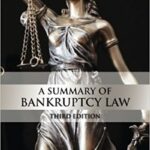
The American Bankruptcy Institute under the leadership of retired Judge Eugene Wedoff is gathering input for a review of changes needed in consumer bankruptcy law. I was privileged to offer my thoughts at NACBA’s 25th annual convention in May.
Good Morning, I’m Cathy Moran. I’ve practiced bankruptcy law in the Silicon Valley, in California’s Northern District, for 37 years.
I’ve been a bankruptcy specialist, certified by the California State Bar Board of Legal Specialization, for 21 years.
I’ve divided my comments this morning into two general categories: the specific and the systemic. Both need change if bankruptcy is going to realize its potential to enable individuals to lead financially stronger lives.
Specific Changes
Student loans
I’m sure you’ll hear from others much about student loan discharge and the need for a better balance between the interests of student loan lenders and guarantors and the interests of borrowers.
Short of changing the test for the discharge of student loans, there are lesser changes which would aid borrowers in dealing with their loans.
- One, recognize student loans as long term debt on which payments can properly be maintained through out the life of a Chapter 13 plan. Allow separate classification of student loans in the plan.
- Alternatively, permit debtors to continue to service student loans directly. Where I practice, neither are presently permitted. Instead we effectively require debtors to default on their student loans and incur significant collection costs in addition to the oft crippling loans themselves.
Use Chapter 13 to practice savings
No credible financial counselor would craft a budget for a client that had them spending every penny they take in. Yet that’s how our Chapter 13 calculation of monthly disposable income works.
The means test makes no allowance for routine replacement of household goods, the repair of appliances, much less the unexpected or catastrophic event. Without an approved mechanism for an emergency fund, a bump in the financial road leads to plan defaults, the need for plan modification, additional attorneys fees, or dismissal.
Even when a family can get through 5 years without some unplanned expense, the system has missed an opportunity to build a saving habit. Three or five years of practice at saving would be more powerful in the future lives of debtors than a one hour financial management class.
Retirement
The bankruptcy system contributes to our national attitude that retirement will take care of itself. That’s an exercise in wishful thinking.
Saving for retirement should be a reasonable and necessary living expense. To conduct ourselves as though it isn’t is to perpetuate the hope that old age will take care of itself, magically.
Our current system allows only retirement savings where contributions are mandatory; yet fewer and fewer individuals have the kind of employment that requires retirement savings.
Early plan payoff
Chapter 13, as it operates, is divorced from financial common sense when it resists early payoff of Chapter 13 plans.
Whether by reason of improving finances or an unexpected windfall, or the willingness to reach into exempt assets to fund plan pay off, too many Chapter 13 trustees oppose early payoff.
What creditor would reject payment of $100 now, in favor of 10 future payments of $10.
Which is a segue way to attitudinal changes within the system.
Systemic Changes
Chapter 13 as serving time
With a system that exposes any improvement in circumstances to capture for the benefit of creditors, it becomes harder for counsel to pitch the advantages of Chapter 13 over alternatives. Chapter 20 looks better. Debt settlement which fixes the payment schedule at the outset look better.
The risks of Chapter 13 swallowing any improvement in the debtor’s financial situation are becoming disproportionate to the benefits of the shrunken Chapter 13 discharge.
Conditioning access increases costs disproportionately
The misbegotten idea that consumers were flocking to bankruptcy in an irresponsible attempt to avoid paying their just debts has lead to the enormous increase in cost of bankruptcy representation.
The means test, the need for supporting documents, and the threat of having to defend your need for bankruptcy against a taxpayer funded lawyer from the Office of the US Trustee with a prosecutorial mentality makes bankruptcy difficult for the unsophisticated or the stressed consumer.
My sense is that trustees feel their supervisors expect them to act as inquisitors. Yet the statistics about “abusive filings” suggest this is a remedy without an ailment. We’ve just succeeded in pricing bankruptcy out of the reach of too many.
Fair compensation of counsel
While the Code and pronouncements from the bench mouth the platitudes about compensating counsel for consumer debtors consistent with fees paid to lawyers in other fields, it doesn’t happen consistently enough to attract capable and committed lawyers to this field.
Court sanctioned “flat fees” are crafted not so much to pay the average value of services, but rather the minimum that a consumer case could cost. Judges apparently fear overpaying the journeyman lawyer more than they do starving the capable out of the field.
The issue of how fees for representation after plan completion but before discharge, such as lien stripping and Rule 3002.1, is without guidance or procedures.
The opportunity for a fresh start is unique and valuable in our economic system. Access to a fresh start needs attention and support lest it become a platitude rather than a reality.







